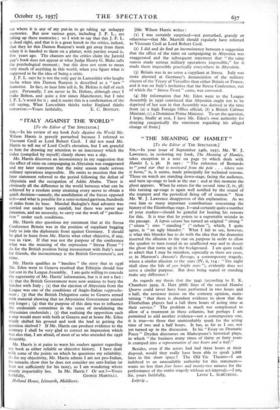"ITALY AGAINST THE WORLD"
[To the Editor of THE SPECTATOR.] SIR,—In his review of my book Italy Against the World Mr. Wilson Harris is gravel' perturbed because I referred to Viscount Cecil as Lord Robert Cecil. I did not need Mr. Harris to tell me of Lord Cecil's elevation, but I am grateful to him for drawing my attention to an inaccuracy which the index (compiled by myself) clearly shows was a slip.
Mr. Harris discovers an inconsistency in my suggestion that the effect of rains on campaigning in Abyssinia was exaggerated and my later statement that the rainy season made serious military operations impossible. He omits to mention that the later statement referred to the period following the defeat of Abyssinia and the occupation of Addis Ababa. There is obviously all the difference in the world between what can be achieved by a resolute army straining every nerve to obtain a quick decision—namely, the annihilation of the forces opposed to it—and what is possible for a semi-isolated garrison, hundreds of miles from its base. Marshal Badoglio's final advance was carried out under heavy rainfall, but there was never any intention, and no necessity, to carry out the work of" pacifica- tion" under such conditions.
Mr. Harris also questions my statement that at the Stresa Conference Britain was in the position of suppliant begging Italy to join the diplomatic front against Germany. I should be glad to learn from Mr. Harris what other objective, if any, was in view. If that was not the purpose of the conference what was the meaning of the expression "Stresa Front " ? As for the British position being inconsistent with Italy's need for friends, the inconsistency is the British Government's, not mine.
Mr. Harris qualifies as " baseless " the story that in z936 Mr. Eden went to Geneva resolved that Ethiopia should lose her seat in the League Assembly. I am quite willing to concede the superiority of Mr. Harris' information, but is it not a fact : (i) that the British Government were now anxious to bury the hatchet with Italy ; (2) that the ejection of Abyssinia from the League was one of the conditions of Anglo-Italian rapproche- ment; (3) that the British Delegation came to Geneva armed with material showing that no Abyssinian Government existed any longer ; (4) that the purpose of this data was to influence the credentials committee in the sense, of invalidating the Abyssinian credentials ; (5) that realising the opposition such a step would meet with both at Geneva and at home Mr. Eden wisely shifted his ground and took the lead in getting the question shelved ? If Mr. Harris can produce evidence to the contrary I shall be very glad to correct an impression which was also that, I am afraid, of most of us who attended the 1936 Assembly: Mr. Harris is at pains to warn his readers against regarding my book as either reliable or objective history. I have dealt 'with some of the points on which he questions my reliability. As for my objectivity, Mr. Harris admits I am not pro-Italian, his remarks show that he does not consider me anti-Italian (at least not sufficiently for his taste), so I am wondering where exactly impartiality lies. In Mr. Harris ? Or not ?—Yours faithfully, GEORGE MARTELLI.
Holland House, Isleworth, Middlesex. [Mr. Wilson Harris writes : (i) I was certainly surprised—not perturbed, gravely or otherwise—that Mr. Martelli should regularly have referred to Viscount Cecil as Lord Robert Cecil.
(2) I did and do find an inconsistency between a suggestion that the effect of the rains on campaigning in Abyssinia was exaggerated and the subsequent statement that "the rainy season made serious military operations impossible," for it made them impossible practically everywhere in Abyssinia.
(3) Britain was in no sense a suppliant at Stresa. Italy was more alarmed at Germany's denunciation of the military clauses of the Treaty of Versailles than either Britain or France, and it was on Italy's invitation that the Stresa Conference, out of which the "Stresa Front" came, was convened.
(4) MY information that Mr. Eden went to the League Assembly in 1936. convinced that Abyssinia ought not to be deprived of her seat in that Assembly was derived at the time from (a) a high Foreign Office official, (b) a British Cabinet Minister, (c) a Dominion Prime Minister. To set the question, I hope, finally at rest, I have Mr. Eden's own authority for denying categorically the statement regarding his alleged change of front.]






















































 Previous page
Previous page